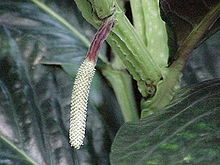Piper (genus)
| Piper | |
|---|---|
 |
|
| Lacquered pepper (P. magnificum) inflorescence | |
| Scientific classification | |
| Kingdom: | Plantae |
| (unranked): | Angiosperms |
| (unranked): | Magnoliids |
| Order: | Piperales |
| Family: | Piperaceae |
| Genus: |
Piper L. |
| Species | |
|
1000–2000; see list |
|
| Synonyms | |
|
|
1000–2000; see list
Piper, the pepper plants or pepper vines (a term used for certain Clematis in older times), are an economically and ecologically important genus in the family Piperaceae.
It contains about 1,000-2,000 species of shrubs, herbs, and lianas, many of which are dominant species in their native habitat. The diversification of this taxon is of interest to understanding the evolution of plants.
Pepper plants belong to the magnoliids, which are angiosperms but neither monocots nor eudicots. Their family, Piperaceae, is most closely related to the lizardtail family (Saururaceae), which in fact generally look like smaller, more delicate and pepper plants. Both families have characteristic tail-shaped inflorescences covered in tiny flowers. A somewhat less close relative is the pipevine family (Aristolochiaceae). A well-known and very close relative – being also part of the Piperaceae – are the radiator plants of the genus Peperomia.
The scientific name Piper and the common name "pepper" are derived from the Sanskrit term pippali, denoting the long pepper (P. longum).
Piper species have a pantropical distribution, and are most commonly found in the understory of lowland tropical rainforests, but can also occur in clearings and in higher elevation life zones such as cloud forests; one species (Japanese Pepper, P. kadsura, from southern Japan and southernmost Korea) is subtropical and can tolerate light winter frost. Peppers are often dominant species where they are found.
...
Wikipedia
